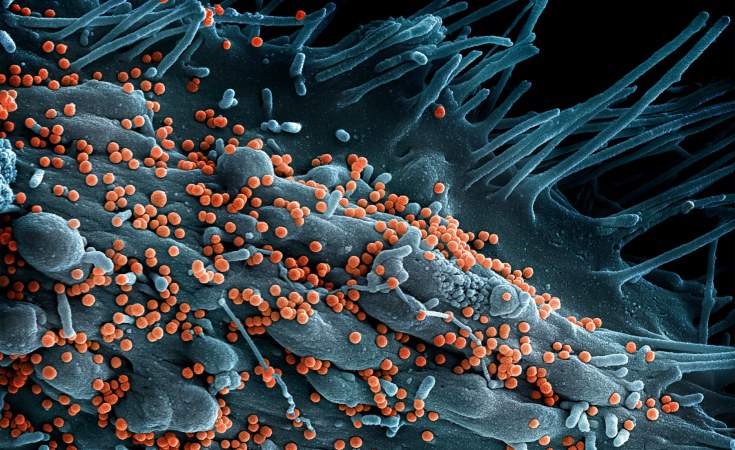The omicron variant of SARS-CoV-2, the virus that causes COVID-19, has now been around for more than a year. Before omicron became dominant, there had been a quick succession of named variants of concern - from alpha, to beta, to gamma, to delta. But now it seems as though we're facing a never-ending string of letter and number combinations denoting the children and grandchildren of omicron: BA.2, BA.2.75, BA.5, BQ.1, BF.7, XBB - the list goes on.
So what does it take for a new variant to earn a Greek letter for a name, and are we ever going to see omicron replaced?
By way of background, the World Health Organization (WHO) announced in May 2021 that key variants of SARS-CoV-2 would be assigned names from the Greek alphabet, in addition to their scientific designations.
The aim was to give the public a simple way to talk about them and also to avoid stigma. SARS-CoV-2 variants were previously referred to depending on where they were first detected.
What makes a variant?
When a virus such as SARS-CoV-2 replicates, it makes copies of itself. This process is a bit like copying a document without a spell checker - it results in typos.
These mistakes might lead to changes in the amino acids that make up a protein, altering its structure or function. These proteins form either the structural architecture of a virus or some of the machinery needed for the virus to replicate.
Usually, these mistakes or "mutations" in the architecture or machinery weaken the virus. Occasionally though, they render the virus better able to cause disease, spread, or evade our immune system. When viruses with the same set of typos are found in enough hosts, that group is called a variant.
As long as SARS-CoV-2 continues to spread, it will keep evolving and new variants will continue to emerge.
Never-ending omicron
Genetic surveillance identifies SARS-CoV-2 variants that have the potential to be more transmissible, better evade our immune system, or cause more severe disease. These are classified as variants of interest or variants of concern. The WHO has designated five variants of concern with Greek letter names to date.
On November 26 2021, B.1.1.529 was identified as a variant of concern by the WHO and renamed omicron. At that time, omicron demonstrated a drastic shift in the virus' evolution, with double the number of mutations in the spike protein (a protein on the surface of SARS-CoV-2 which allows it to attach to our cells) compared with alpha and delta.
It was this dramatic genetic change, coupled with its greater capacity to transmit between people and evade prior immunity, that prompted the WHO to name omicron as a variant of concern.
As of now, omicron is the only variant infecting people. Alpha, beta, gamma and delta are all now classified as "previously circulating" variants of concern.
While there are genetic differences between omicron's children such as BA.2 and BA.5, and its grandchildren XBB and BQ.1, they're all reasonably similar to each other and the original omicron strain. That's why they're considered descendants of omicron rather than their own distinct variants.
Some scientists have argued that from a public communications standpoint this system could do with a rethink. Specifically, they believe the high bar the WHO has set for new variants of concern should be lowered to enable the public to follow how COVID is still changing.
The search for pi
Omicron's continued dominance can largely be explained by its increased capacity to spread between people, and its ability to evade prior immunity from infection and vaccination. It's difficult for a significantly different virus to compete against omicron and establish itself.
Scientists globally continue to monitor the evolution of SARS-CoV-2, though this is becoming harder because testing and surveillance efforts have been scaled back.
The next variant of concern will be named pi, the letter after omicron in the Greek alphabet. For pi to be designated, there would need to be a large difference in the genetic sequence compared with omicron, and the variant would have to be significantly more infectious or cause more severe disease.
This new pi variant might come from animals. While there are few documented cases of animals spreading COVID to humans, a different host species can allow different mutations to develop.
Alternatively, pi might develop within an immunocompromised host. SARS-CoV-2 has demonstrated an ability to mutate quickly in clinically vulnerable people whose immune systems struggle to clear the virus, allowing it time to develop a large number of mutations.
What next?
All viruses change over time and SARS-CoV-2 is no different. More variants of concern will likely be named, although this will probably slow.
Maria Van Kerkhove, the WHO's technical lead on the COVID pandemic, has previously suggested that once we run out of Greek letters, new variants might be named after star constellations. This hasn't been officially confirmed, but one thing we do know is that this isn't likely to happen any time soon.
Victoria Easton, Virology Research and Teaching Fellow, School of Molecular and Cellular Biology, University of Leeds


